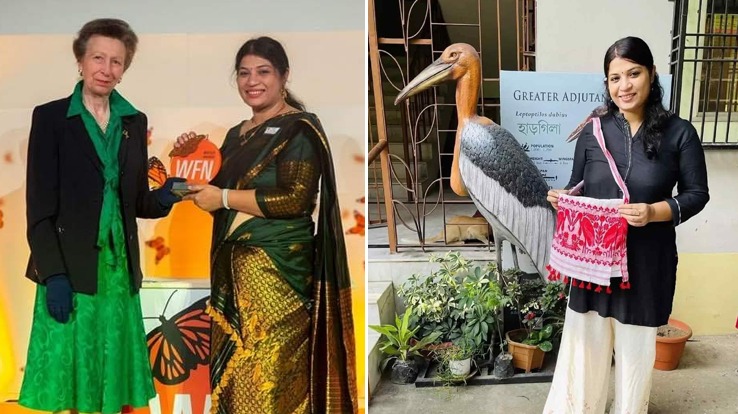Guwahati, May 2: In a remarkable achievement, wildlife biologist Dr Purnima Devi Barman from Assam has been awarded the prestigious Whitley Gold Award, also known as the ‘Green Oscar’, for her tireless efforts in conserving the endangered Greater Adjutant Stork, locally known as Hargila.
The Whitley Fund for Nature (WFN), a UK-based charity, recognized Barman’s outstanding work and presented her with the £100,000 award at a ceremony in London on May 1. Princess Anne, the charity’s patron, handed over the well-deserved prize to Barman.

Central Minister and Former Chief Minister of Assam took to Twitter to congratulate her, stating, “My heartiest congratulations to Smt Purnima Devi Barman on winning the prestigious Whitley Gold Award 2024, also known as the Green Oscar. Her Hargila Army has been inspirational in showing how Jan Bhagidari can help protect the environment & conserve species and she stands as the epitome of Nari Shakti.”
My heartiest congratulations to Smt Purnima Devi Barman on winning the prestigious Whitley Gold Award 2024 also known as the Green Oscar.
Her Hargila Army has been inspirational in showing how Jan Bhagidari can help protect the environment & conserve species and she stands as… pic.twitter.com/xX5z3iznTL
— Sarbananda Sonowal (Modi Ka Parivar) (@sarbanandsonwal) May 2, 2024
Barman’s journey to protect the Hargila began with her fascination with these majestic birds. However, she noticed that most people seemed to dislike them. Undeterred, she set out on a mission to change attitudes and mobilize local communities, primarily women, to safeguard the storks’ nests. Her efforts led to the formation of the ‘Hargila Army’, a group of dedicated women who work together to protect the birds.
Thanks to Barman’s unwavering commitment and the support of her NGO Aaranyak, the Hargila population in Northeast India has seen a remarkable recovery, growing from a mere 450 birds to over 1,800. Barman aims to further increase the global population of these storks to 5,000 by 2030 by expanding her conservation initiatives across the bird’s range in India and Cambodia.
The Hargila plays a crucial role in maintaining the ecological balance of Assam’s wetlands, which cover more than 15% of the state. By consuming decaying organic matter, these storks help recycle nutrients and promote ecosystem health.
WATCH:
Find latest news from every corner of Northeast India at hubnetwork.in, your online source for breaking news, video coverage.
Also, Follow us on-
Twitter-twitter.com/nemediahub
Youtube channel- www.youtube.com/@NortheastMediaHub2020
Instagram- www.instagram.com/ne_media_hub





